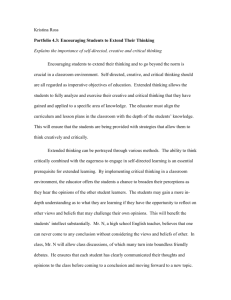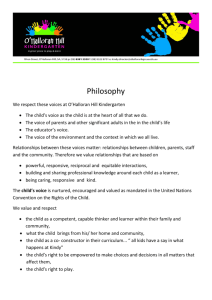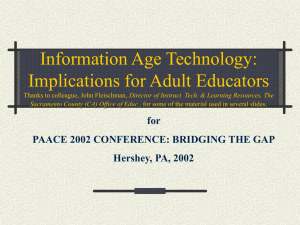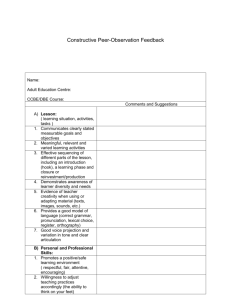Appendix B: Professional Learning Overview
advertisement
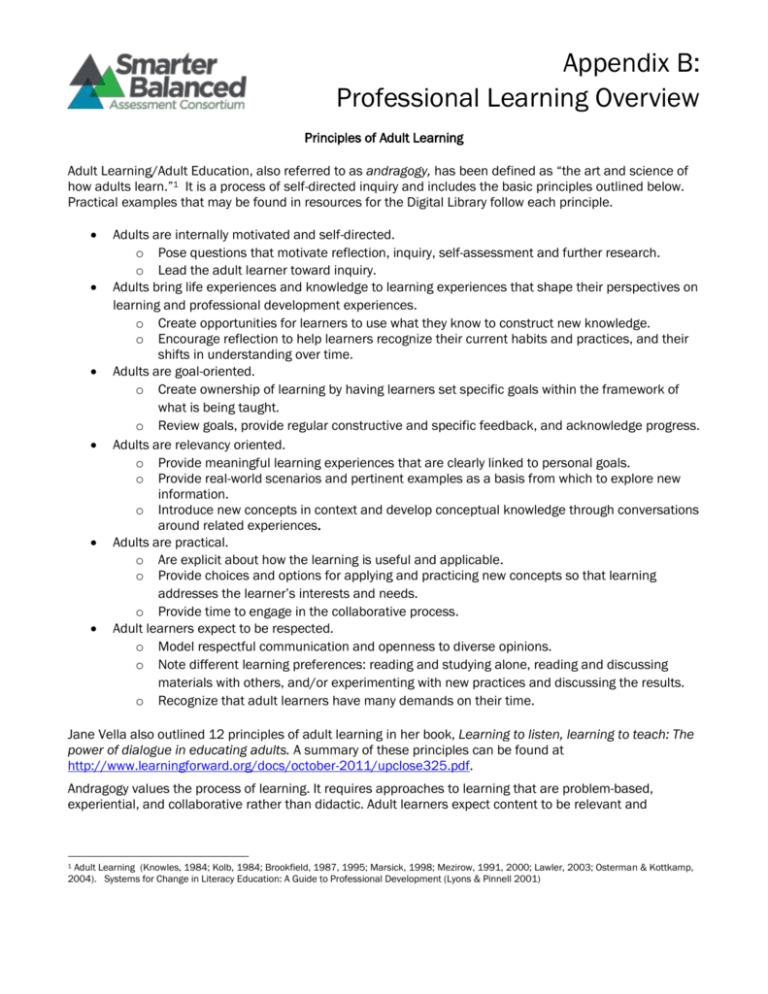
Appendix B: Professional Learning Overview Principles of Adult Learning Adult Learning/Adult Education, also referred to as andragogy, has been defined as “the art and science of how adults learn.”1 It is a process of self-directed inquiry and includes the basic principles outlined below. Practical examples that may be found in resources for the Digital Library follow each principle. Adults are internally motivated and self-directed. o Pose questions that motivate reflection, inquiry, self-assessment and further research. o Lead the adult learner toward inquiry. Adults bring life experiences and knowledge to learning experiences that shape their perspectives on learning and professional development experiences. o Create opportunities for learners to use what they know to construct new knowledge. o Encourage reflection to help learners recognize their current habits and practices, and their shifts in understanding over time. Adults are goal-oriented. o Create ownership of learning by having learners set specific goals within the framework of what is being taught. o Review goals, provide regular constructive and specific feedback, and acknowledge progress. Adults are relevancy oriented. o Provide meaningful learning experiences that are clearly linked to personal goals. o Provide real-world scenarios and pertinent examples as a basis from which to explore new information. o Introduce new concepts in context and develop conceptual knowledge through conversations around related experiences. Adults are practical. o Are explicit about how the learning is useful and applicable. o Provide choices and options for applying and practicing new concepts so that learning addresses the learner’s interests and needs. o Provide time to engage in the collaborative process. Adult learners expect to be respected. o Model respectful communication and openness to diverse opinions. o Note different learning preferences: reading and studying alone, reading and discussing materials with others, and/or experimenting with new practices and discussing the results. o Recognize that adult learners have many demands on their time. Jane Vella also outlined 12 principles of adult learning in her book, Learning to listen, learning to teach: The power of dialogue in educating adults. A summary of these principles can be found at http://www.learningforward.org/docs/october-2011/upclose325.pdf. Andragogy values the process of learning. It requires approaches to learning that are problem-based, experiential, and collaborative rather than didactic. Adult learners expect content to be relevant and Adult Learning (Knowles, 1984; Kolb, 1984; Brookfield, 1987, 1995; Marsick, 1998; Mezirow, 1991, 2000; Lawler, 2003; Osterman & Kottkamp, 2004). Systems for Change in Literacy Education: A Guide to Professional Development (Lyons & Pinnell 2001) 1 Appendix B: Professional Learning Overview applicable to their real-world needs, and expect respect and equality between the teacher and the learner. When creating opportunities to support adult learning, be sure to consider social context and culture. Principles of Effective Professional Learning While many state departments of education and school districts align their professional development with principles for adult learning, there are also several sets of principles specific to professional learning. Learning Forward, formerly known as the National Staff Development Council, developed seven standards that are frequently referenced in education. These principles are found below. Examples for these principles follow. Learning Forward states that professional learning that increases educator effectiveness and results for all students — … occurs within learning communities committed to continuous improvement, collective responsibility, and goal alignment. (Learning Communities) … requires skillful leaders who develop capacity, advocate, and create support systems for professional learning. (Leadership) … requires prioritizing, monitoring, and coordinating resources for educator learning. (Resources) … uses a variety of sources and types of student, educator, and system data to plan, assess, and evaluate professional learning. (Data) … integrates theories, research, and models of human learning to achieve its intended outcomes. (Learning Designs) … applies research on change and sustains support for implementation of professional learning for long-term change. (Implementation) … aligns its outcomes with educator performance and student curriculum standards. (Outcomes) 2 Examples of Learning Forward Principles A resource in the Digital Library could reflect one or more of the Learning Forward standards by: Offering guidelines for members of a Professional Learning Community (PLC) to incorporate formative assessment practices into their work. A resource could contain protocols for a PLC to set goals collaboratively and self-assessment templates for educators to gauge their progress toward these goals. Including an educator questionnaire to assess how school systems support professional learning, with suggestions for how to address any gaps. Offering case studies on how schools prioritize their resources for professional learning. Incorporating templates or guidelines for data-collection related to a specific professional learning topic. For example, a resource might include a questionnaire for teachers to assess their comfort level teaching different components of persuasive writing. Explaining the adult learning research that informs the design of the activities in the resource. Outlining checkpoints for the long-term implementation of a strategy or professional learning topic. Detailing the expected outcomes for the adult learner, with suggestions on how to monitor educator performance on related indicators. 2 Learning Forward, http://learningforward.org/standards (2012) Appendix B: Professional Learning Overview Principles for Learning in K-12 Education In 2010, six prominent organizations representing more than 250,000 teachers and administrators endorsed six principles for learning for K-12 education. The organizations were: Association for Career and Technical Education, Consortium for School Networking, National Council for the Social Studies, National Council of Teachers of English, National Council of Teachers of Mathematics, and National Science Teachers Association. While the principles for learning they endorsed relate to students, they are also applicable to adults: 1. 2. 3. 4. 5. 6. Being literate is at the heart of learning in every subject area. Learning is a social act. Learning about learning establishes a habit of inquiry important in lifelong learning. Assessing progress is part of learning. Learning includes turning information into knowledge using multiple media. Learning occurs in a global context. More information about these six principles for learning can be found online at: http://www.ncte.org/library/NCTEFiles/Press/Principles_for_Learning%205-10%20(2)%20.pdf.
